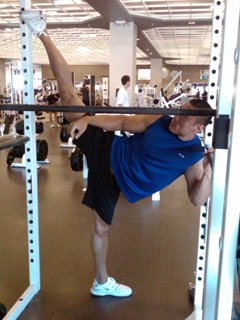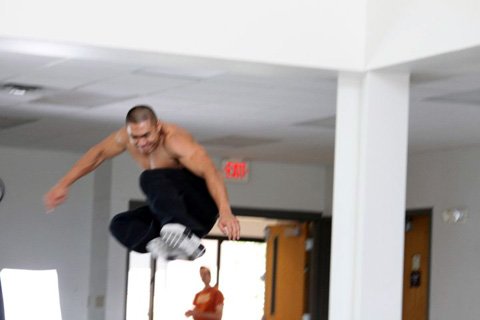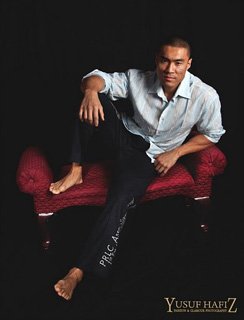
Vital Stats
Name: John Lee
Age: 29
Education/Certification: ACE
Location: Dallas, TX
Contact Info: aries3231981@yahoo.com
Number Of Clients: 10
Rates: $79 per session 1 on 1, $100-200 per month program-design

[ Q ] When and why did you become a trainer?
I became a trainer in 2002. At the time, I was studying pre-medicine at the University of TX. Medicine has always interested me because I've witnessed so many otherwise healthy people's lives decimated by illnesses, chronic or otherwise. As I slowly drifted off-course and started to learn more about the health and fitness lifestyle, I became convinced that prevention was the key to living a long, fulfilling life.
By the time the diseases are diagnosed, it is often too late. The desire to help others to increase their quality of life and extend the lengths of their youth became a big driving force for me to grow into this industry.
Sports have always interested me as well. Growing up with a huge martial arts background, I enjoyed finding new ways to be better, faster, stronger, etc. Sports science and nutrition slowly became an integral focal point of my research and education. The endless ways the human body finds to constantly evolve and progress gave me the strong desire to be consistently on the cutting edge of information.

 Click To Enlarge.
Click To Enlarge. Growing Up With A Huge Martial Arts Background, I Enjoyed
Finding New Ways To Be Better, Faster, And Stronger.

[ Q ] What is your training style? What methods do you use?
My training style is adaptive. As each person is highly individualistic mentally, physically, psychologically, and emotionally, so should their training. Goals are also different. My success is dependent on recognizing these variables and coming up with the best plans for each. My ability to execute these plans also depends on my faith and confidence in my training, so I tend to spend a lot of time putting the pieces together.
Most of the time, my training tends to be a hybrid of skilled aerobic training, plyometrics, and free-weight resistance training. My goal is to train the clients with methods tested and researched on the forefront of sports science so as to reach their respective goals with maximum efficiency.

 Click To Enlarge.
Click To Enlarge. My Training Tends To Be A Hybrid Of Skilled Aerobic
Training, Plyometrics, And Free-Weight Resistance Training.

[ Q ] Do you have examples of success stories from clients using your methods?
Too many to count. A successful trainer is always in the pursuit of results. That's the priority. In my 8+ years of training, I've helped many go from a sedentary lifestyle of dependence to an active lifestyle of independence. A lot of trainers measure their success through weight-loss. I do not.
Goals are individualistic. Helping someone lose 20lbs of fat when his goal is to better a golf swing is not my idea of success. Whether it's helping someone run his first 5k ever without slowing down to a walk or bench press twice his body weight without a net gain in weight, I find ways to deliver.

[ Q ] Who are some of your most notable clients?
My clients come from all walks of life. They are lawyers and execs, teachers and students, fathers and daughters. The number one rule I adhere to as a trainer is client confidentiality, so they shall remain nameless here. I will say that most of my clients are successful in one form or another. They are high on their respective career ladders because of their ability to work hard, think creatively, and stay consistent. What I do is take that inner discipline and drive they have for other things in their lives and turn into a new passion for health and fitness.

 Click To Enlarge.
Click To Enlarge. I Take Their Inner Discipline And Drive And Turn
It Into A Passion For Health And Fitness.

[ Q ] What are the most common mistakes a client makes?
- Thinking that joining a gym is the last thing missing in their fitness journey when it is often the first.
- Placing the blame on the trainer when the client has failed to live up to his end of the bargain, which is the follow-through.
- Thinking that a workout program can ever come close to replacing the need for a sound nutritional plan.
- Falsely believing that supplements are the answer they've been looking for.
- Wanting to focus on particular body parts instead of looking at the body as the big picture.
- Trying to figure out the answers from the perspective of what they need to do more of, when the answer lays in things they should do less of.

[ Q ] What are the most common mistakes you believe a trainer makes?
- Failure to individualize programs, which essentially means they use the same workouts over and over again for a bunch of different clients.
- Laziness on the job, which usually means they've stopped caring about making a difference in the lives of people.
- Failure to uphold high fitness/health standards in their own personal lives, which speaks volumes about the mindset of that trainer and what he/she thinks of the importance of health/fitness.
- Not being professional; not being presentable.
- Failure to evolve training methods based on latest research findings.

[ Q ] Do you set your clients up with a full diet and training plan for them to follow by themselves?
Of course not. Meal-planning falls under the job description of Registered Dietitians and doing so would be illegal on my part. What I do make are suggestions based on available research. I help the client develop a sound mental approach to diet/exercise/nutrition so that he can come to his conclusions about exactly what his body needs, much in the same way that I do without the need for a Registered Dietitian.

 Click To Enlarge.
Click To Enlarge. I Help The Client Develop A Sound Mental Approach To
Diet/Exercise/Nutrition So They Can Come Their Own Conclusions.

[ Q ] How do you keep your clients motivated?
Motivation starts from within, I merely stoke the fire by fostering that little seed of fire and helping it grow. I motivate the client through tracking, feedbacks, and accountability. Motivation also comes from leading by example, and never failing to live up to the same expectations I lay upon my clients. When you live and breathe the same lifestyle you preach to your clients, they are much more likely to follow.

[ Q ] Do you train a male client differently to a female?
Of course. I train everyone differently based on their goals/needs/wants/background/experience. If a woman wants to finish a 5k without stopping to rest, how would a program designed to boost the 1RM of her bench press help? However, if the question is whether or not I'd make a girl do sets of 6-8 instead of 12-15 if I think it would help her reach her goals faster, the answer is yes.

[ Q ] How have your changed your approach to clients over the years of experience?
Yes, of course. Training evolves. If it doesn't, I've failed to live up to my standards as a trainer to constantly seek improvement and refinement.

[ Q ] How do you start a client on a new program? Do you do some kind of assessment?
Starting a client on a new program without an assessment would be the same as asking the client to rip out a page from a fitness magazine and doing that workout for 8 weeks. One of the main benefits of having a trainer is so that the client can receive individual attention based on his/her unique set of qualifications. Without proper evaluations beforehand, it would be the same as blind leading the blind. I always start with a fitness assessment.
Based on client feedback and raw data, I can then design a program that would fit in the schedule and lifestyle of that client. Change is gradual, habits take time to form, and adherence is key to long-term success. I don't use the kitchen-sink method, nor do I throw paint on the wall hoping some would stick.

 Click To Enlarge.
Click To Enlarge. Starting A Client Without An Assessment Would Be The Same Ripping Out
A Page From A Magazine And Doing That Workout For 8 Weeks.

[ Q ] Do you prefer to train male or female clients and why?
I don't have a preference as to male or female clients. I do, however, prefer to train clients I connect on some emotional level. It helps both of us stay connected and tuned in to each other as we take this journey together. Training someone who is genuinely wanting and willing to change for the better makes this job a much more rewarding experience. It also drives my success rate through the roof.

[ Q ] Do you feel just as much like a psychologist as you do a personal trainer?
Yes. Living a healthy lifestyle is as much of a mental battle as it is a physical one. In fact, I would venture to say that my mindset, not my workouts, is what separates me from people who are falling behind. It's not the exercises; it's not protein/carb/fats; it's not plyometrics, cardio, or resistance training; it's really about constantly wanting and willing to shuffle the deck so you can find new and better ways to fit these pieces together over and over again.
